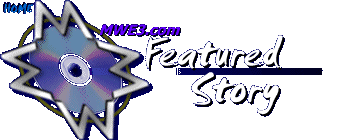IN THE LAND OF THE SEVEN MOONS
an interview with JACK BRUCE and ROBIN TROWER
written by Robert Silverstein
Released in early 2008, Seven Moons is the long awaited return
from Jack Bruce and Robin Trower.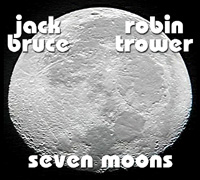 Crafting a new power trio with drummer Gary Husband, this latest offering
by Cream bass legend Jack Bruce with former Procol Harum guitar hero
Robin Trower truly brings 20th century rock into the millennium. Combining
the pioneering rock sound that Jack Bruce brought forth in Cream with
the electrifying guitar innovations of Robin Trower, Seven Moons
pairs melody and might and the results make for a bold blues rock
CD layered with a progressive rock edge. Released on V-12 / Big Daddy
Records in early 2008, Seven Moons commenced following the
2005 Cream reunion—a milestone event that found Jack Bruce playing
live for the first time in decades with his former band mates Eric
Clapton and Ginger Baker. Jack Bruce in particular is planning a busy
year in 2008—releasing a triple CD BBC sessions set while readying
a six CD retrospective and an upcoming tour on the Summer ‘08
Hippiefest tour. Currently on his 2008 world tour, Robin Trower had
great things to say about the making of Seven Moons and sounded
jazzed at the prospects of possible live dates with Jack Bruce in
late 2008.
Crafting a new power trio with drummer Gary Husband, this latest offering
by Cream bass legend Jack Bruce with former Procol Harum guitar hero
Robin Trower truly brings 20th century rock into the millennium. Combining
the pioneering rock sound that Jack Bruce brought forth in Cream with
the electrifying guitar innovations of Robin Trower, Seven Moons
pairs melody and might and the results make for a bold blues rock
CD layered with a progressive rock edge. Released on V-12 / Big Daddy
Records in early 2008, Seven Moons commenced following the
2005 Cream reunion—a milestone event that found Jack Bruce playing
live for the first time in decades with his former band mates Eric
Clapton and Ginger Baker. Jack Bruce in particular is planning a busy
year in 2008—releasing a triple CD BBC sessions set while readying
a six CD retrospective and an upcoming tour on the Summer ‘08
Hippiefest tour. Currently on his 2008 world tour, Robin Trower had
great things to say about the making of Seven Moons and sounded
jazzed at the prospects of possible live dates with Jack Bruce in
late 2008.
{On March 17, 2008,
Robin Trower and Jack Bruce were each interviewed by Robert Silverstein
of MWE3.com and 20th Century Guitar about Seven Moons, current and
future plans and more. The following interview first appeared in the
June 2008 issue of 20th Century Guitar and MWE3.com now presents the
original full length interviews with rock legends Jack Bruce and Robin
Trower.}
JACK BRUCE
RS: The new CD you made with Robin Trower Seven Moons is among
the best albums of the year.
JB: I’m very proud of it.
RS: I interviewed Robin in 2006 and at that time he sounded excited
at the prospect of working with you again. How did you and Robin finish
the Seven Moons CD?
JB: You mean the writing process? Robin would show up at my house
and he’d have all these great ideas. He had the ideas for these
songs...all of the songs. And then we just worked together on them.
He had the basic idea and the lyric and I just put my little touch
on it and turned into a song. That’s the way we work. We’ve
always worked that way. Well, more than ever we’re working that
way now. And it’s good. Good way to work. And it worked for us.
Then we just took it into the studio and recorded it, more or less
live. The vocals were guide vocals and I would overdub the vocal,
Robin would stick on some solos and there you have it. That’s
the way we used to do it in the old days with Cream and everything,
you know? His studio is a funky little place. Very like the old days.
Done live without using any earphones or anything. It was nice.
RS: How about the chemistry of you and Robin working with drummer
Gary Husband?
JB: Gary is one of my all time favorite drummers. And so I really
wanted to have Gary on there because I knew he could add a lot to
it, and he did. You don’t need to tell him a lot, he just knows
what to do. And that’s my kind of drummer, you know? So all in
all, the recording was just a joy and you could feel something good
happening. What we managed to do is to kind of get a lot of space
happening in the records. And that’s what I like about it. We
didn’t fill up every hole. (laughter) And that’s basically
it. A very simple way of recording in the end.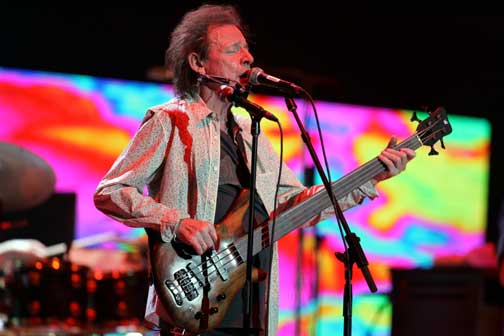
RS: When you and Robin worked on the Seven Moons CD did you
also write the lyrics?
JB: Well yeah, we worked on the lyrics a little bit together but the
lyrics were mostly there. I like to just interpret lyrics, change
things here and there and just do it. Mostly they’re second take
vocals. And it’s all done with a lot of fun.
RS: Seven Moons has a great clean sound in the studio...
JB: We did it on tape and then dumped it on to digital, for safety
reasons. And then we went back to tape and then it was mixed.
RS: Speaking of great lyrics, how’s Pete Brown these days?
JB: I think he’s doing fine but I haven’t really spoken
to Pete very much recently. I haven’t seen him for a while. But
I think he’s doing fine.
RS: I always admired the fascinating combination of Pete’s lyrics
and your music.
JB: There’s also a retrospective coming out in June. A six CD
set of a lot of stuff I did from the very beginning, some stuff that’s
never been released before. Stuff with Zappa, just various things.
A whole retrospective of my career, you know? So it’s good.
RS: Is that just of your solo career? How about Cream and even before?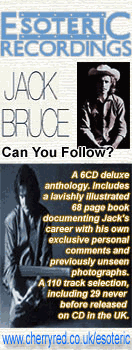
JB: Yeah, it’s well before Cream. It starts off with my work
with Alexis Koerner. I think that’s the first thing and then
it goes through everything I’ve done really. Mostly my solo things,
things with Cream, the track I did, “Apostrophe” with Zappa.
Some stuff I did, just various things. Lots and lots of stuff. It’s
six CDs so it’s pretty extensive.
RS: Is Universal putting it out?
JB: It’s through Universal, yeah. But the label, I couldn’t
really tell you the name of it at the moment. But we’re working
on it and it’s coming out, I believe in June.
RS: I want to ask about several of the new songs on the new Seven
Moons CD. Can you say something about the CD title and the title
track “Seven Moons”?
JB: Yeah, you tell me a song and I’ll try and make a comment
on it. “Seven Moons” I think was a good one to start the
album off with ‘cause it’s kind of a manifesto of what the
album is. It’s fairly open. It harks back almost to Disraeli
Gears in a way but it’s just us, just Robin and me. It’s
just what it is. It reflects what I’ve done and what Robin has
done and it’s very much coming from our hearts.
RS: “Lives Of Clay” is sort of like a modern day version
of “Politician.”
JB: Yeah, there’s a little bit of that in it but it’s not
really looking back too much. It’s more like what we’re
doing, what we’re thinking now. I think in it’s own way,
it’s quite modern.
RS: “She’s Not The One” has a great beat and rhythm
on that track.
JB: Yeah, I like that one too. I like them all. I think they’ve
all got something to say. It’s really up to the listener to make
(laughter) their minds up about it.
RS: “The Last Door” has sounds a little like “Deserted
Cities Of The Heart.”
JB: Yeah, I think that’s a little bleak but times are a little
bleak at the moment, let’s face it. You can’t just write
songs and everything’s fine. Moon and June and all that stuff.
But we are facing some rough old times.
RS: You and Robin seem to thrive in the trio format. What do you like
best about working in a power trio format?
JB: For me, I’ve always liked a lot of space. When I started
out I was really a jazz musician and I like playing in jazz trios
without a piano. ‘Cause I think when you do that, for a bass
player and a vocalist, it gives you that space to really open up.
I’ve always liked the trio format, no doubt about that. I like
working with bigger groups but I’ve always had that little soft
spot for a trio thing. (laughter)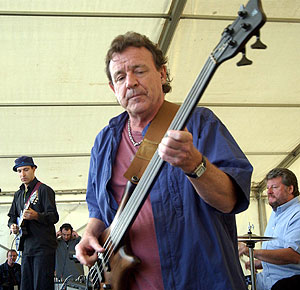
RS: Well it doesn’t get better than working with both Eric and
Robin in power trios.
JB: I think Robin has reached a real peak in his playing. When I first
started working with him he was great but he was still looking for
his thing, I think. But he’s found it now and he’s really
playing, he’s really playing! He’s so confident and it’s
just like he can do no wrong. He’s just on this peak at the moment.
And that was the way we felt with all the songs. Like when you do
an overdub, or just do a take, you could tell. It was there, you know.
And that’s a good sign. And I really haven’t had that, I
guess, since the old days. Since Cream, really. I think those songs
are living and breathing songs.
RS: Can you say something about your bass and amp set up while recording
the Seven Moons CD?
JB: Yeah, I decided to make it very, very simple and basic. It was
just done through a small amp. And I’m using an EB-1 bass, which
I thought would really suit that kind of format. But also kind of
not bringing my fretless, which is my first love. My Warwick fretless.
That’s my first love, as an instrument. But for these tracks
I thought I had to limit myself to playing a functional kind of bass.
So that the guitar, so that Robin was really the featured instrument.
I wasn’t trying to play a lot of notes or make it a certain thing.
I just wanted to be in a supporting role for that record. And that’s
why I chose that instrument to play because it really...It’s
just what it is. It’s an original ‘50s instrument so it
just has that real solid sound that used to exist even before the
Cream era. It’s really a great ground and a really great sound
for that album. When I’m doing something else, with like my own
band, I prefer to play the fretless because I can really play much
more melodically and everything. But for that particular record, I
just wanted to play very simple. And I didn’t use any effects
or anything like that. Just a straight bass sound. Straight, supporting
bass sound for Robin. And to get that solid trio sound.
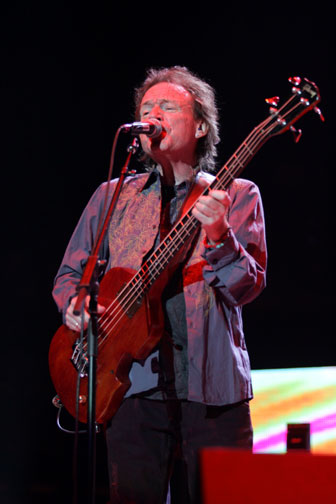 RS:
What bass strings are you using on the new record?
RS:
What bass strings are you using on the new record?
JB: I always use S.I.T. strings. I kind of fell in love with those,
years ago now. And I’ve never changed since then. I think for
me, they’re the best strings. They’re very well made. Very
rarely get one that isn’t perfect. And they do stay in tune!
(laughter) Which in a trio format is also very important. They’re
just great strings. And a very small Hartke amp. One twelve inch speaker.
And that was it. It was just like recording in the old days you know?
Like the very old days. Of course I had a D.I. going into the board
as well so we had two tracks at least to chose from, to mix. That’s
the way I like to work anyway. When I did all my early solo albums
I used to use the EB-3. And I used a Marshall 50 watt, which was a
great sound as well. Slightly different, but it’s very similar.
RS: Your bass playing is always so definitive. You’ve said
you sometimes play the bass like a rhythm guitar.
JB:
Sometimes, yeah. Sometimes. It depends what I’m doing. If I’m
playing live, I’ll play a lot more chords in almost a flamenco
style but with this it’s just really straight ahead, hopefully
classic type bass lines. And I’m playing a supportive role as
well. I thought was important because of the way Robin is now playing
I just wanted to really back him up so that he had plenty of space
to do his thing, which is doing, as I say, I think better than we’ve
ever played. In my opinion, he’s a master and he’s really
on a peak right now, I think.
RS: I think it’s his best album yet.
JB: Yeah, I think in many ways you might be right. I mean I did go
back and really listen to some of those other things we did together.
There’s some great things on there but this is slightly different
and he’s just there. He’s just got it.
RS: So there were no overdubs at all?
JB: Oh, no. The tracks were done live and then I would be singing
with the guide vocals. Because obviously when you’re singing
live in a fairly small room you can’t really get the sound you
want on the vocals. So I would then just go in and overdub. I remember,
the vocals were mostly all done in one day. And Robin was just doing
his overdubs. The solos mostly were done as overdubs. So it was like
a rhythm track in the old sense of the word. And then a couple of
overdubs. Not a lot. We both really wanted that live vibe. It’s
the vibe more than anything else that we wanted. And I think we achieved
it.
RS: Seven Moons really makes you look good and as you said,
it’s maybe the best thing Robin’s done too you know?
JB: Certainly, it’s up there. As an Lp it’s up there and
we’re both thrilled with it. I was just talking to Robin recently...today
in fact. He’s on the road. And it was nice. He’s very happy.
RS: You also have a three CD set here in 2008 called Spirit: Live
At The BBC coming out next month.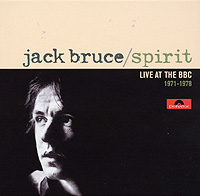
JB: It’s pretty interesting. It’s just the stuff I recorded
with various bands from the ‘70s to the ‘80s I guess. There’s
some good stuff on there. Different bands. The band I had with Graham
Bond, originally, years ago. And the band I had with Simon Phillips
and people like that. So there’s three CDs in that. That’s
coming out March the 31st, in this country. I don’t know about
the States. Probably, when it comes out, you’ll have to get it
as an import, (laughter) I guess. It’s not such a difficult thing
these days with like buying things on line, and so on. And then there’s
several DVD’s coming out, in a package, which are pretty interesting.
Some live concerts and a film called Rope Ladder To The Moon, which
I did many years ago. That’s coming out as well. And then, as
I said before, in June, a six CD box set retrospective, which has
got some unusual things on, to say the least. For people who are interested,
that’s (laughter) quite a good thing. It’s like my life
in a box. (laughter)
RS: Your life transcends any box. I wouldn’t put you in a box,
but I know what you mean.
JB: (laughter) It’s funny when you can put all your musical life
into six CDs. (laughter) There’s quite a few things on there
but that’s mostly the stuff you could license. So it’s good.
RS: Is there a title for that box?
JB: Not as yet. I can’t give you a definitive title yet, no.
Working on that.
RS: Well, my life in a box, but I wouldn’t use that one! (laughter)
There’s so many box sets now. I think you’re overdue for
one for sure. There’s also Jack Bruce with the HR Big Band,
featuring versions of Jack performing songs old and new arranged for
the wonderful German orchestra of Hessische Rundfunk.
JB: Hessische Rundfunk yeah. That was just a one off gig I did with
this big band. We did some arrangements of old songs and some fairly
newer songs. It was just a concert. It was done live in front of a
polite audience and recorded. And I’m pleased with that as well.
It’s just another side of me working with a big band. And it
was fun to do. Really fine musicians.
RS: I heard a great cover of “Never Tell Your Mother She’s
Out Of Tune” on that CD.
JB: That’s the one yeah. That’s a good one. It’s a
good version of it.
RS: You had a big band sound back in 1969!
JB: Yeah, that’s why we wanted to do that again, because it’s
an even bigger band now. When I did it, it was just four horns, George
Harrison on guitar, me on piano and bass and I think it was Jon Hiseman
on drums. So it was a fairly big step from Cream, after Cream, as
you know.
RS: It’s two years on since the Cream reunion, which was a pretty
monumental moment in rock history.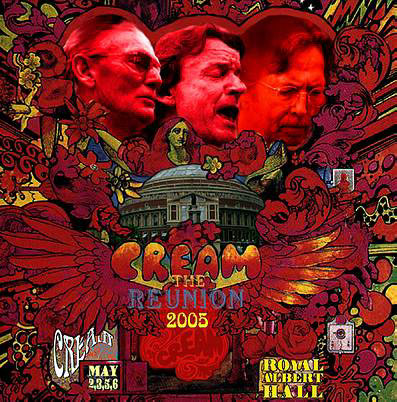
JB: Yeah, it was great for us to do it. I had just recovered. I was
in the process of recovering from being quite ill. So I hadn’t
regained my complete strength as yet. So that was a slight problem,
but I still managed to get away with it! (laughter) And it’s
nice to be able to do Seven Moons, where I’m actually
firing on most of my cylinders.
RS: Yeah, there’s that sense of renewed energy...
JB: Like I say, I was still quite ill when I did the Cream reunion
thing, but it was still definitely worth doing.
RS: Is there a remote chance you could do some recording in the studio
with Eric and Ginger again?
JB: Yeah, we did talk about it a little bit some time ago. It would
be interesting to try and do it. But the problem is that when you’re
young and when I was writing those songs with Pete Brown and so on...
That was a certain period of time where we were in touch with what
was happening. It would be interesting to try. Yeah, I would like
to do it. And so much as finding time for the other guys to actually
do it, hopefully, it’s possible. And certainly I would like to
play with those guys again, yeah, absolutely. They’re always
fun to play with.
RS: Cream are a pillar of progressive rock in a lot of ways.
JB: Right.
RS: Could you compare working with Robin on the new CD to working
with Eric, even recently?
JB: Well, I mean, I wouldn’t compare. I think they’re vastly
different kinds of players. Robin’s got his thing, which is his
thing. And Eric obviously has got his thing, which is in a way much
more of a blues thing. He’s really gone back to being a blues
player again, I reckon. But I don’t like to compare different
players. I played with people from Allan Holdsworth to Gary Moore.
Lots of really fine guitar players. They’re all different in
their own way. They’ve all got their particular things that are
actually very great. For me, with Robin, I just feel he was very inspired
on Seven Moons. Having new material to work with, this is always
good.
RS: I heard your old college, the Royal Scottish Academy of Music
and Drama, gave you an honorary doctorate.
JB: Yeah, that was nice. I went up there and played. And they have
a place called the Jack Bruce Zone, which is a place where the students
can actually put on their own performances. So that’s really
a nice tribute to me and one I was quite surprised about because when
I left the college, I didn’t leave under the best (laughter)
of circumstances. But times move on and I think they realized that
what I was trying to do then has become more valid now. At the time,
it was a very classically oriented place and they didn’t understand
what I was trying to do in those old days. But times changed as I
say and now they understand a bit more. It was a real honor to get
that. Yeah, definitely. Very proud of it.
RS: I hope when kids want to find out how all of this great music
started, they will go back and explore the music you created.
JB: With all of the iTunes and everything, you can get everything
now. You can get an actual overview of the whole musical development
and things. Which, it’s very interesting for youngsters, I think.
They can lie back and listen to Skip James or Robert Johnson. All
those different great blues players, where the music came out of.
So they can hear all of that and then they can hear what we did. What
other bands did and what bands are doing now. And it’s all one
kind of great development. It’s really cool.
RS: Downloading misses all the cool artwork featured on the albums
back then.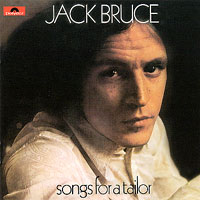
JB: Yeah, when you download things, it’s not quite the same.
But it’s also nice because I can go onto iTunes and find things
I didn’t know existed or find things I’ve lost over the
years, because my vinyl is...obviously I haven’t got a lot of
the old vinyl things I used to have and I can at least get a version
of them now. So I think there’s good and bad in all of it. It’s
the technology. We have to live with it because it exists. It’s
not going to go back in time, is it? It’s not going to go back
to the way it was. And we have to enjoy what we’ve got now and
make the best of it. And that’s what I’m trying to do. I’ve
got some amazing things on my iPod. (laughter) And I’m very happy
with that. If you’ve got an hour or two, I can go and sit down
at the computer and find me some sounds that I didn’t know existed,
like a version of “We’re Going Wrong,” which was recorded
by Minnie Ripperton in the late ‘60s. It’s just fabulous.
I didn’t even know it existed until about a month ago. So from
that point of view it’s really great. So it’s all very cool,
yeah. I’m very happy about it. I’m very happy with the fact
that I’m still able to go in the studio and write some new songs
with Robin and record them and then come out and people are buying
them. It’s good.
RS: I’m also glad you and Robin were able to print the lyrics
for Seven Moons. It sort of completes the trip so to speak.
JB: Yeah, exactly. There’s a lot of nice lyrics there. True.
RS: I’m going to let you go in a minute. But one of my favorite
albums you made is a rare album called Automatic. Any chance
of that coming out on CD?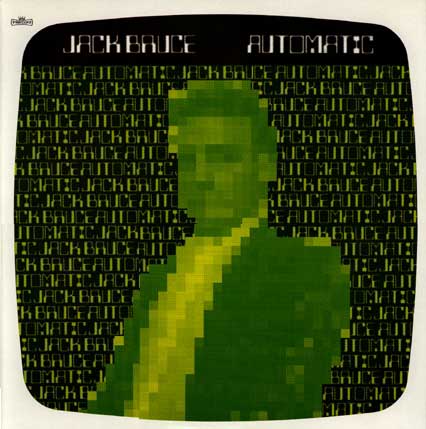
JB: Oh yeah, do you like that? Well there’s some tracks on the
(upcoming) box set. There’s going to be some tracks on that,
I believe.
RS: I just remember the whole record was brilliant, from start to
finish.
JB: Well, that was just me with a computer. (laughter) So that was
kind of interesting.
RS: We’re going to see Robin play next week, here on Long Island.
Are you planning to do any live shows with Robin in the future?
JB: I’m doing, actually this summer, a Hippiefest tour, all over
the states, starting at the end of June and going through July and
stuff. So I’ll be doing some of that. And hopefully, maybe I
could do a gig or two with Robin later on in Europe or something.
RS: That’s going to be great. I guess you’ll be playing
with Godfrey Townsend on the Hippiefest tour.
JB: It’s Godfrey and Steve (Murphy) on drums. So that’ll
be fun. I’m looking forward to that as well.
RS: Well, I know you were ill earlier in the decade. With the world
today, I guess having a positive mental outlook is almost as important
as having a good physical outlook.
JB: You can’t stress that enough. It’s so important. You’re
right there. Absolutely. So that’s what I’m doing. I’m
trying to be positive and it’s great. I’ve got my family.
They’re all musicians. My daughter has got her first album coming
out. So it’s all very interesting times.
RS: Wow. Are you playing on your daughter’s record?
JB: On one track. I’m just doing a little blues thing on one
track, but I did get it started off. (laughter) She plays with some
young people now, so it’s good.
RS: So she’s keeping the Bruce family name in the musical eye
so to speak.
JB: Absolutely. We’re a dynasty now. I’ve got a 15 year
old kid who’s a drummer and another daughter who’s a singer.
And my older son, he’s a composer so it’s all going on.
(laughter) But I’m mostly proud of the Seven Moons thing.
I’m really happy that we managed to do that and it’s come
out. It’s been great. It’s something that I’m really
happy that we did.
RS: I’ve played it at least twenty times and it’s showing
no wear and tear on my ears...
JB: Yeah. (laughter) I think it grows on you, that one.
RS: Congratulations again on that one.
JB: Again, thanks for that. I appreciate it. And thanks for your interest.
RS: Take great care of your health.
JB: I’ll do the best I can. Don’t worry. (laughter)
RS: I’ll always be grateful for the great music you made when
I was young and as I was growing up. It had a huge influence on me.
JB: I can hear that. I try my best. I do appreciate it. You take care
of yourself.
Thanks to Jack Bruce and Margrit Seyfer @ www.jackbruce.com
and to Godfrey Townsend @ www.godfreytownsendmusic.com
ROBIN TROWER
RS: I spoke to Jack Bruce and he’s real happy with the Seven
Moons album.
RT: Yeah, we both are!
RS: Jack says you’ve hit a new peak in your guitar career.
RT: That’s very kind of him, I must say.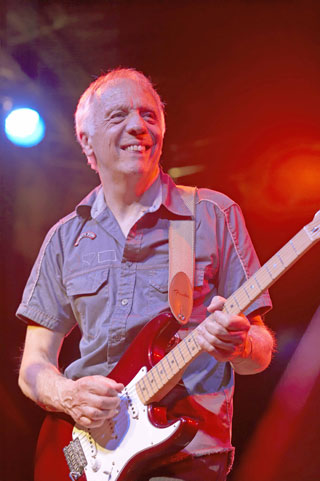
RS: You were talking about recording with Jack about a year and a
half ago. How did you and Jack finish making the Seven Moons CD?
RT: I don’t know whether I mentioned it last time we spoke but,
really how it came about was the fact that we were talking for quite
a few years about trying to get the tapes to do a remix, repackaging
of some of the best stuff we did in the ‘80s. And Jack came up
with the idea of let’s write a couple of new tracks to mix in
with it. So we got together and started writing and then before we
knew where we were, we had four or five songs. And we just said, ‘let’s
make an album.’ That’s how it came about.
RS: Jack’s vocals sound great on the new CD.
RT: Absolutely, he’s definitely at the top of his game. There’s
no doubt about it.
RS: How would you describe working on the record with drummer Gary
Husband?
RT: That’s a different kind of drummer then anybody I ever worked
with. Obviously Jack had worked with him before. And it was Jack that
recommended him. I just think he has another dimension as well, Gary.
RS: Are you playing any of the Seven Moons album on the new
tour?
RT: No, no. Because I figured well, not many people in the audience
would know any of the songs. I would mean they would just think, ‘Oh,
this is another song I don’t know.’ And without Jack singing
it, it wouldn’t have the same impact, I don’t think. As
great a singer as Davey is, that’s with me on tour, I just think
those songs belong to Jack.
RS: Did you and Jack collaborate with him on the Seven Moons
writing?
RT: Yeah. I mean we co-wrote all the songs. Although, I would come
to him with a guitar idea and a lyric, or a lyric idea. And he would
write the vocal melody, which is the top line, obviously the most
important part. And then we’d sought of knock it into shape playing
it together. Guitar and bass and vocals. And so basically when we
got to go in the studio with Gary, Jack and I had a pretty good idea
of what we were going to do with it. And Gary was really, really quick.
You’d run it through a couple times and we’d take it a couple
of times. And usually it was the first or second take.
RS: So you wrote most of the lyrics too?
RT: I wrote all the lyrics, yeah.
RS: I told Jack it sounds very live in the studio but there was some
overdubbing.
RT: Yeah, that’s right. The vocals were all overdubbed. And a
lot of the solo work is overdubbed. The only solo that I played live
with the take was “Come To Me.”
RS: What guitars are you using on the Seven Moons CD?
RT: I was using my signature model Strat. That’s what I play
now. I was playing through a Full Drive 2, which is an old Fulltone
pedal I’ve had for many years. And I was using these Cornell
Plexi amps. Little 18/20 watt 1 X 12. So I linked two of those together
for the studio.
RS: The sound of Seven Moons has a vintage vibe but it has
a modern edge to it.
RT: Yeah, we went to tape. We recorded to tape, because I still think,
and Jack agrees with me, that. Well we both thought that we should
got to tape because we like what tape does for the music. But then
the guy that mixed it, Mark, he brought it into a more modern kind
of sound from there.
RS: Do you have any Seven Moons favorites?
RT: I think “Distant Places Of The Heart.” If I had to choose
one, that was a particular favorite. I’m happy with all of them.
They all work.
RS: Is there a story behind the title Seven Moons, how did
you come up with the name?
RT: No, not really. Initially, obviously when you’re writing
lyrics, ideas just pop into your head. Some you reject, some you keep.
That ended up being the title of that song and eventually became the
title of the album. It’s just one of those things. I don’t
know how or where lyrics come from to be honest. You work at it. You’re
after a particular kind of vibe or whatever. And I’m trying to
tell a story there in that song about how we could maybe be living
a better life, somewhere. I don’t know if you’ve ever read
or seen the film, Lost Horizon by James Hilton. There’s
a book called Lost Horizon and they live in this place called
Shangri-la. It’s a bit after that. The Land Of The Seven Moons.
RS: “Lives Of Clay” is another great Seven Moons track.
It hints at a rude awakening for western culture.
RT: Yeah, it’s about what we’re doing to the planet, definitely.
And what we’re doing to ourselves. Look, a lot of my lyrics are
about what I’m thinking about. Things that are going on in my
life or in the world. I express a lot of those ideas out through lyrics.
The lyric, for instance of “A Perfect Place” is about drug
addicts. I saw a documentary about drug addicts. That’s where
that lyric springs from.
RS: “She’s Not The One” has a great beat and rhythm
on that track.
RT: Yeah, I do love that rhythm track. I think its special.
RS: “So Far To Yesterday” is another great song.
RT: Yeah I’m very happy with that. What Jack sort of did with
that melodically, I think, is what makes that song really.
RS: If I had to pick a single from Seven Moons, I would pick
“The Last Door.” Its just a killer song.
RT: A lot of people have said that about that one being sort of commercial,
which is nice. If you stand a chance of reaching an audience that
you normally wouldn’t reach, that’s great. I don’t
think its a ‘hit’ but if it possibly could get played on
the radio you might reach people that wouldn’t hear your stuff
normally.
RS: What do you like best about playing in the power trio format?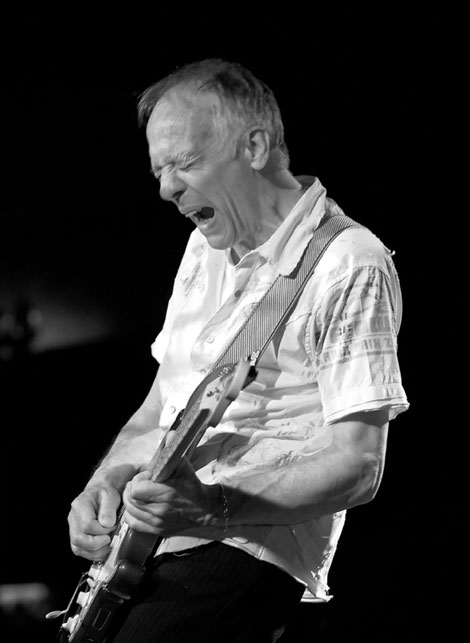
RT: Well, the thing is, it gives you a lot more space and freedom
on the guitar. That’s really the thing of it. And you have to
play with such commitment, it’s a hundred percent or it ain’t
gonna work. And I like that. I like music to have commitment to it.
That’s what was always great about early rock and roll to me.
You’d hear a Little Richard track. It doesn’t take any prisoners.
Its a total commitment to the cause.
RS: You changed around your live band. I know Davey’s still with
you.
RT: Davey Pattison. We’ve got a different bass player out from
last time. This time we’ve got Glenn Lynch on bass. A guy that
I worked with quite a lot in the ‘80s. He’s American, lives
in California. And Pete Thompson’s still the drummer.
RS: I know you’re touring here and then back to Europe, where
I heard Jack may play some gigs with you?
RT: Well I mean we’re talking about doing some gigs but nothing’s
sort of been set in stone yet. We’re just talking about it at
the moment. We’re hoping to get together and do something together,
maybe in the autumn. ‘Cause Jack’s got an American tour
coming up in the summer.
RS: Any plans for you beyond the current tour?
RT: Well for the last couple years I’ve been writing material
for a potential instrumental album. Whether I’ll actually record
that this year or not depends on whether Jack and I tour, whether
I do any more touring later in the year. It’s open at the moment.
RS: Would an instrumental album be in the power trio format?
RT: No, it would be more... I don’t know you’d describe
it really. I’m hearing it in my head as more of a late night
thing. But I’ll have to see. You’ve gotta work these things
up.
RS: You’ve done some soundtrack music in the past.
RT: Yeah, that’s right. But this instrumental album, if I do
it, for me to get what I want out of it, I would need to have a B-3
player. You know, have an organ on it. It would be a different thing
all together to the power trio thing.
RS: It would be compliment to all the diverse music you’ve made
in the past.
RT: I think it would be something different. And that’s what
I’m trying to do now with records, is to do something different.
That’s why the thing of working with Jack appeals to me so much.
RS: Well he’s the greatest living rock legend singer that I’ve
ever heard.
RT: Yeah, it’s true. He’s dynamite!
RS: Anything else you’d like to add about the Seven Moons
CD?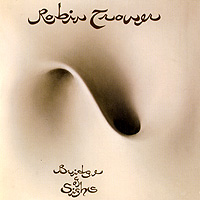
RT: Well, just that I’m absolutely thrilled with it because it
turned out I think, better than Jack and I even hoped.
RS: I told Jack the Seven Moons lyrics are really excellent
too.
RT: Thank you very much. I appreciate that.
RS: One last thing about the 2006 Bridge Of Sighs remaster.
I was really glad they added on the BBC live cuts.
RT: And I think the remastering of it has made a difference as well.
That’s a nice package now.
RS: Are you planning any more CD reissues with that kind of bonus
cuts in the future?
RT: Not that I know of. Because the thing is, obviously, that stuff
all belongs to EMI now, all that early stuff. So I don’t have
any real say in it, although I did okay the mastering of it and put
my, hey Kenneth. But we’ll have to see.
RS: Any surprises in the set list on the current live tour?
RT: Well, I’m doing some stuff from the ‘70s that I’ve
never played live before, which makes it very interesting for me and
obviously it’s great for anybody that knows the songs to hear
them for the first time live.
RS: How about a live DVD of the tour?
RT: I think we are being filmed, I think it’s Detroit. But we’re
not sure to what end or whether it would be usable or whatever. We’re
just going to be filmed and just see how it turns out.
Thanks to Robin Trower @ www.TrowerPower.com
